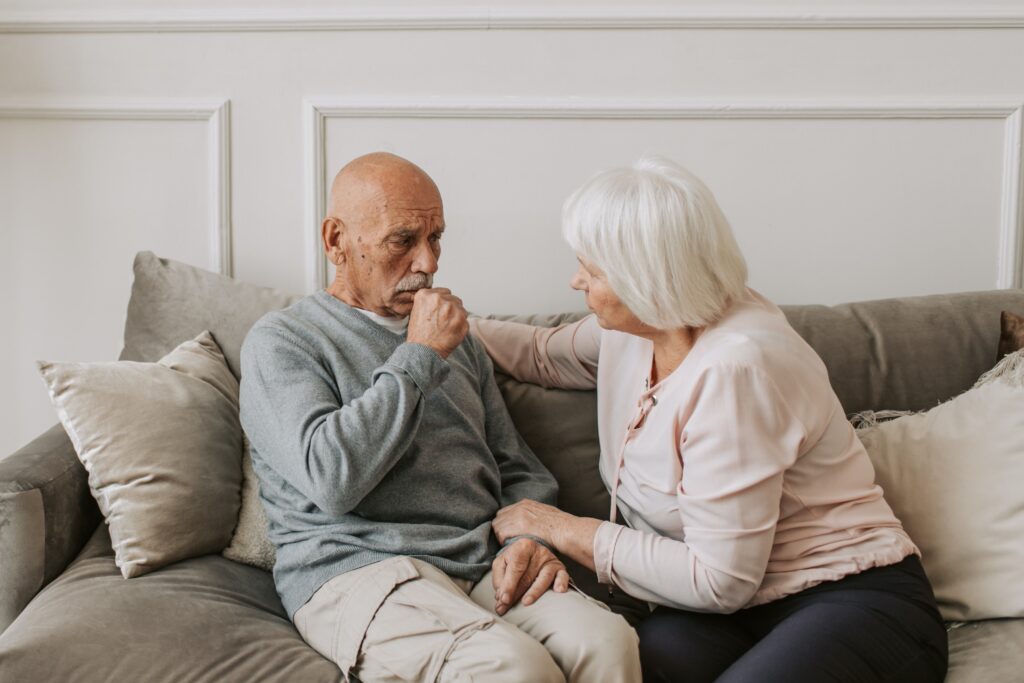
If you or a family member is hospitalized or in need of the comfort and grace of the Sacrament of the Anointing of the Sick, please contact the Parish Office.
The Sacrament of the Anointing of the Sick is the Church’s sacrament for those who are sick and aging, and is a sacred moment when we pray for God’s grace to strengthen someone who is suffering from any form of illness. The Sacrament of the Anointing of the Sick is perhaps the most misunderstood of all the Sacraments – many remember the times when the Sacrament was reserved only for those who were dying. While our theology has not changed, our practice has. Anyone who is facing a serious illness or operation is encouraged to request this Sacrament. However, there is no absolute nor emergency requirement for this Sacrament. Below is some information on the Sacrament, who should receive it, and what happens during the ritual.
How do I arrange to be anointed?
If you or someone in your family is in need of the Sacrament of Anointing of the Sick, please contact the Parish Office.
What happens during the Sacrament of Anointing?
There are three parts to the Rite:
First, there is a prayer of faith asking God’s help for the person who is sick.
Second, there is the laying on of hands by the priest, which is a sign of blessing and the invocation of the Holy Spirit to come upon the sick person.
Third, the anointing with the Oil of the Infirm on the forehead and hands of the sick person.
How often can I receive the Sacrament?
The Anointing of the Sick is not a Sacrament that is meant to be received often. Once received, it may be repeated if the sick person recovers after being anointed and then falls ill again, or if during the same illness, the person’s condition becomes more serious. Some people think that the more often they receive the Sacrament, the more effective it will be. This is not the case.
Can a deacon or layperson anoint?
No. Only a priest can administer the Sacrament of the Anointing of the Sick, since part of the ritual includes the Sacrament of Reconciliation (Penance). However, if a priest is not available, please remember that Anointing of the Sick is not required nor absolutely necessary for a peaceful death. Other pastoral ministers or chaplains, who are properly trained and appointed, can provide prayers and non-sacramental rites appropriate to the time of death.
Can a person who has died be anointed?
No. The Church teaches that the Sacrament is for the living, and does not permit the anointing of anyone who has already died. However, there are many other beautiful prayers and rituals in the official Rite of the Church for those who have already died.
How has the Sacrament changed over time? What happened to “Last Rites?”
In the early Christian Church, the Church prayed for its sick members. Oil, brought by the faithful, was blessed by the bishop. Anyone could use or apply oil in times of illness.
Centuries later, a rite for the anointing of the sick was developed. This rite was celebrated by the community gathered, and the sick person to be anointed was generally able to be restored to health. At the same time, people began putting off the Sacrament of Penance until shortly before death, because at the time, it was received only once in a lifetime. Therefore, they couldn’t receive the Sacrament of Anointing of the Sick until they had confessed their sins and been reconciled. Since both Sacraments would therefore often occur just before death, the Sacrament of the Anointing of the Sick became the Sacrament of the Dying, or “Last Rites.” Church teachers who knew of this practice explained anointing as preparation for death, rather than the prayer of the Church for the sick.
While the official teaching of the Church urged people not to wait until the time of death for anointing, most people did. Some families even waited for the dying person to be unconscious before calling a priest.
Today, the Church teaches that the Anointing of the Sick is for the seriously ill. A person need not be in danger of dying. The Sacrament can be received more than once over the course of an illness, as a person’s health changes. We encourage you to request this Sacrament early during the course of a serious illness.
“Last Rites,” more properly known as Viaticum (which means “food for the journey”) refers to the reception of Holy Communion by a person near death. It may be administered by a Deacon or layperson, in addition to the priest.

